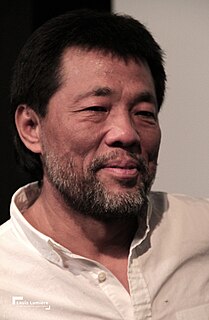
The Royal Horticultural Society (RHS), founded in 1804 as the Horticultural Society of London, is the UK's leading gardening charity.

The Hundred Flowers Campaign, also termed the Hundred Flowers Movement, was a period in 1956 in the People's Republic of China during which the Communist Party of China (CPC) encouraged its citizens to express openly their opinions of the communist regime. Differing views and solutions to national policy were encouraged based on the famous expression by Communist Party Chairman Mao Zedong: "The policy of letting a hundred flowers bloom and a hundred schools of thought contend is designed to promote the flourishing of the arts and the progress of science". The movement was in part a response to the demoralization of intellectuals, who felt estranged from the Communist Party.

The Golden Rooster Awards are awards in film given in mainland China. The awards were originally given annually, beginning in 1981. The name of the award came from the year of the Rooster in 1981. Award recipients receive a statuette in the shape of a golden rooster, and are selected by a jury of filmmakers, film experts, and film historians. The awards are given out by the China Film Association.

China Huabiao Film Awards, also simply known as Huabiao Awards, is an annual awards ceremony for Chinese cinema. Named after the decorative Chinese winged columns (huabiaos), The Huabiao Awards were first instituted in 1957 as the Ministry of Culture Excellence Film awards. Between 1958 and 1979, no awards were given. In 1994, the awards were renamed "Huabiao." The ceremony is held in Beijing, is highest government honor in film industry. Along with Golden Rooster Awards, Hundred Flowers Awards, these are known as China's three main film awards.

Mark Lee Ping-bing is a Taiwanese cinematographer, photographer and author with over 70 films and 21 international awards to his credit including 2 Glory Of The Country Awards from the Government Information Office of Taiwan and the president of Taiwan's Light Of The Cinema Award. Lee began his film career in 1977 and in 1985 he started his prolific collaboration with Taiwanese filmmaker Hou Hsiao-hsien. Known best for his use of natural lighting utilizing real film and graceful camera movement, Lee received the Grand Technical Prize at the Cannes Film Festival in 2000 for In the Mood for Love. A member of the Academy of Motion Picture Arts and Sciences, Lee was honored with nominations by the American Society of Cinematographers for its 2014 First Annual Spotlight Award for Best Cinematography for his work on the 2012 film Renoir and by the French Academy of Cinema Arts for a Cesar Award for Best Cinematography in 2014 also for the film Renoir.
The Hundred Flowers Award for Best Actress was first awarded by the China Film Association in 1962.
The Hundred Flowers Award for Best Actor was first awarded by the China Film Association in 1962.
The Hundred Flowers Award for Best Supporting Actor was first awarded by the China Film Association in 1962.
The Hundred Flowers Award for Best Supporting Actress was first awarded by the China Film Association in 1962.
The Hundred Flowers Award for Best Director was first awarded by the China Film Association in 1962. During 1981-2004, there were no awards presented in the Best Director category.
The Hundred Flowers Award for Best Cinematography was first awarded by the China Film Association in 1962.
The Hundred Flowers Award for Best Art Direction was first awarded by the China Film Association in 1962.
The Hundred Flowers Award for Best Animation was first awarded by the China Film Association in 1962.
The Hundred Flowers Award for Best Chinese Opera Film was first awarded by the China Film Association in 1962.
The Hundred Flowers Award for Best Co-produced Film was first awarded by the China Film Association in 1994.
The Hundred Flowers Award for Best Picture was first awarded by the China Film Association in 1962.
Ding Jiali is a Chinese actress.
The 32nd Hundred Flowers Awards was a ceremony held on September 27, 2014 in Lanzhou, Gansu province. The nominees were announced on August 23.
Ying Da is a Chinese actor and director, best known in film for portraying Louie Wang in Big Shot's Funeral (2001), Ni Zhengyu in The Tokyo Trial (2006) and Jin Shenghuo in The Message (2009), and has received critical acclaim for his television work, particularly as Zhao Xinmei in Fortress Besieged (1990) and Leng Zixing in The Dream of Red Mansions (2008). As a director, Ying Da is best known for his comedy television series, such as I Love My Family (1993), We Are A Family (2013), Idler: Sister Ma (1999), and Sister Ma and Her Neighborhoods (2000).
This page is based on this
Wikipedia article Text is available under the
CC BY-SA 4.0 license; additional terms may apply.
Images, videos and audio are available under their respective licenses.






